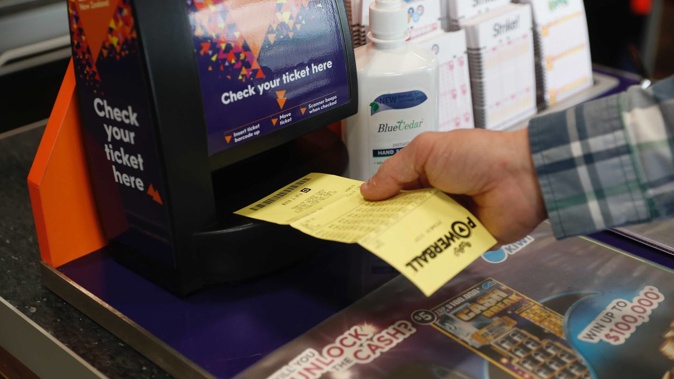
After a betting syndicate claimed $23 million in Lotto winnings this week, New Zealanders might be thinking about pooling their money in pursuit of riches.
But local and overseas experience shows there are a few pitfalls to sharing sudden wealth - with squabbles between syndicate members often ending up in court.
A group of 24 people spread between Northland and Auckland claimed the Lotto Powerball prize, taking home just under $1m each.
The group's members, who asked to remain anonymous, put in $2 each per draw, played lucky dips, and only picked up tickets when the jackpot was over $10 million.
Syndicates can offer a cheaper way to play Lotto or can increase the chances of getting rich. The odds of winning Lotto first division are around 1 in 3.8 million, or 1 in 38 million if you include Powerball.
In 2017, 10 women who met at a Dunedin dental clinic won a $30m Lotto Powerball prize draw. They had paid $2 each to buy a $20 lucky dip.
While these syndicates shared their spoils, legal and consumer experts warn that a big win can split even the closest friends, and it can pay to put in place some simple safeguards.
"Syndicates are obviously a fun way to get Lotto tickets," said Auckland lawyer Debra Law. "It just seems to all fall apart when they win something."
Law represented a client who was part of an Auckland syndicate with friends and workmates. The client won just over $100,000 on a Lotto draw in 2009.
/cloudfront-ap-southeast-2.images.arcpublishing.com/nzme/QJ7C4RXMMQ63NITG75I24MJ33Y.jpg)
Tina, who declined to give her last name, was one of 10 women in a syndicate which won $30m in 2017. Photo / Nick Reed
However, the client said that the winning ticket was not purchased for the syndicate. They had also separately purchased another ticket for their family, which won the prize money.
Other syndicate members were suspicious and took the ticket holder to court. They also secured an injunction which prevented the NZ Lotteries Commission from paying out the prize money.
Law said her client was successful in defending themselves because of the intervention of the commission. The lotteries staffer, giving evidence in the Manukau District Court, verified the time and place the family ticket was bought and their history of choosing the same numbers every week.
She suspected the other members in the syndicate were just "trying it on" to claim some money. But it was an ugly affair. The prize money was frozen in a bank account for two years while the dispute was settled.
"They are not friends anymore," Law said.
Most syndicates had an oral agreement that they would share any winnings. That was legally binding in court, Law said, but often led to a "he-said, she-said" tussle. A written agreement to share the money would be useful in a legal battle, but it was unrealistic.
"Who is actually going to do that? Most people just chuck money in and don't expect it to go wrong."
The best safeguard was to simply take a copy of the ticket every week and share it with other members, she said. Picking the same numbers every week would also make it easier if there was ever a dispute.
Ron Schepers, a New Zealand web developer, took an interest in syndicates when he noticed that a colleague was struggling to manage two workplace syndicates of 20-30 people each.
"I just saw the amount of work involved, all the spreadsheets, and I thought there's got to be an easy way of doing this.
"The other big issue that was out there is trust. We've got some of the wins, like 23 million, and the temptation all of a sudden is to run off with the ticket and not tell anyone.
"And there have been several quite high profile cases in the last 10 years around the world where that actually happened."
In a notorious case in the United States, a construction worker, Americo Lopes, won $66m with a ticket he had bought on behalf of a group of six colleagues. But instead of sharing it, he quit his job, claiming a foot injury. He was later ordered by a jury to divide up his winnings.
With cases like this in mind, Schepers set up a website, MyLottoSyndicate, to make it easier for syndicates to keep track of tickets and payments.
The leader of the syndicate uploads a picture of the ticket to the website before the draw so all members can log in and see what their numbers are. It does not allow them to upload a ticket after the draw, to prevent them from switching out a winning ticket and replacing it with a losing one.
The website also shows if a person has paid for that week's draw. Some of the most controversial cases overseas involve a member of a group forgetting to pay or paying late for a winning ticket, then being cut out of the winnings by the rest of the syndicate.
In 2013, a woman in Liverpool who was involved in a syndicate with all 10 of her colleagues at a recruitment firm left work early with morning sickness on the day on which lottery tickets were bought. Her colleagues won a $55m jackpot and refused to share it with her.
She reportedly returned to the office on Monday to discover empty desks - all her newly-wealthy teammates had quit.
Take your Radio, Podcasts and Music with you









